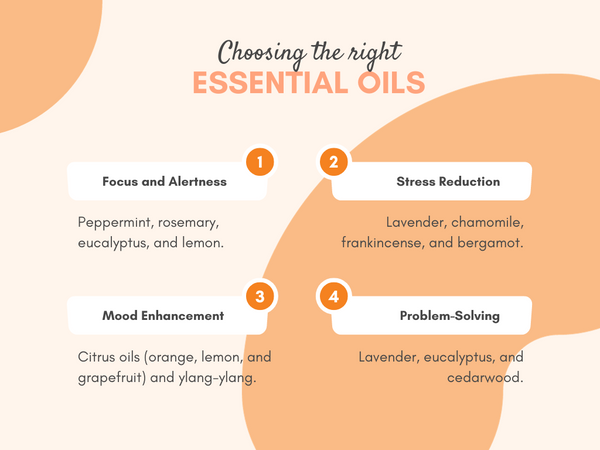Aromatherapy in the Workplace: Boost Focus and Creativity
October 19, 2023In the hustle and bustle of the modern workplace, finding ways to enhance focus, boost morale, and spark creativity has become paramount. As stress and distractions plague employees, employers seek innovative solutions to transform their workplaces into havens of productivity and well-being. Aromatherapy is one such solution, a traditional practice gaining popularity in the current corporate setting.

Read on to learn the benefits of aromatherapy and explore how incorporating essential oils into the workplace can lead to heightened focus, elevated morale, and a surge in creativity.
Understanding Aromatherapy
Aromatherapy, often referred to as essential oil therapy, is a way of holistic healing that uses the aromatic compounds found in various plant extracts to promote physical, emotional, and mental well-being. These essential oils are derived from leaves, flowers, stems, and other parts of plants, retaining their natural fragrance and therapeutic properties. Although it has its roots in ancient civilizations, like Egypt, Greece, and China, its modern resurgence is due to its ability to address contemporary issues such as stress, anxiety, and low productivity.
The Science Behind Aromatherapy
The connection between scent and emotion has been well-established by science. When we inhale a particular scent, it triggers a response in the olfactory system, which is intricately linked to the brain's limbic system – the seat of emotions and memories. This phenomenon explains why certain smells can instantly transport us back to a cherished memory or evoke powerful emotions.
Essential oils used in aromatherapy are carefully selected for their specific therapeutic properties. For instance, lavender is known for its relaxing effects; citrus scents like lemon and orange can boost mood and energy, while peppermint can enhance alertness and concentration. When these oils are diffused into the air, they interact with our olfactory system, triggering physiological responses that contribute to improved focus, increased morale, and heightened creativity1.
Benefits of Aromatherapy in the Workplace
Aromatherapy in the workplace offers many benefits that can significantly impact both employees and employers. Let's delve deeper into these advantages:
Stress Reduction and Improved Mental Health
Workplace stress is a pervasive issue that can lead to burnout, decreased job satisfaction, and even physical health problems. Aromatherapy can act as a natural stress buster. Essential oils like lavender, chamomile, and frankincense are known for their calming properties. When diffused in the workplace, they can help reduce stress and anxiety levels among employees. Lower stress levels contribute to better mental health, increased job satisfaction, and reduced absenteeism2.
Enhanced Productivity
Fostering a focused and alert work environment is crucial for productivity. Aromatherapy can sharpen concentration and cognitive performance, especially with scents like peppermint, rosemary, and citrus oils. When employees can concentrate better on tasks, they are more likely to complete them efficiently and with fewer errors. This increased productivity benefits both employees and the organization3.
Improved Mood and Morale
A happy workplace is a productive workplace. Aromatherapy can help create a positive atmosphere by using uplifting scents like lemon, orange, and bergamot. These citrus oils are known for their mood-enhancing properties. Employees in a good mood are more likely to collaborate, communicate effectively, and approach challenges with a can-do attitude. This boosts overall morale and job satisfaction4.
Enhanced Creativity and Problem-Solving
Creativity is a valuable asset in today's dynamic business world. Aromatherapy can induce relaxation and mental clarity, particularly with essential oils like lavender and eucalyptus. This relaxed yet focused state is conducive to creative thinking and problem-solving. Encouraging employees to use aromatherapy during brainstorming sessions or when tackling complex issues can lead to innovative solutions5.
Better Sleep Quality
Sleep quality directly impacts job performance. Poor sleep can result in drowsiness, reduced alertness, and decreased productivity. Certain essential oils, such as lavender and cedarwood, have soothing properties that can improve sleep quality. Encouraging employees to use these oils at home can lead to more restful sleep, ensuring they come to work refreshed and ready to perform at their best6.
Enhanced Employee Engagement
Engaged employees are more committed, motivated, and enthusiastic about their work. Aromatherapy can contribute to employee engagement by creating a pleasant and inviting workplace environment. Employees who feel that their well-being is prioritized are more likely to be engaged in their roles and contribute positively to the organization.
Reduced Absenteeism
Aromatherapy's stress-reducing and immune-boosting effects can lead to reduced absenteeism. Employees who are less stressed and have better overall health are less likely to take sick days. This ensures a more consistent workforce and reduces the financial burden of covering absent employees.
Enhanced Air Quality
Poor air quality is a problem in many workplaces due to factors like pollution, inadequate ventilation, and the presence of allergens. Aromatherapy using essential oils with antibacterial properties, such as tea tree and eucalyptus, can help purify the air. Cleaner air can reduce the risk of respiratory issues among employees and create a more comfortable working environment.
Positive First Impressions
A well-scented workplace can leave a lasting impression on visitors, clients, and potential employees. A pleasing aroma in the office conveys professionalism, care for employee well-being, and a positive company culture7.
Sustainability and Eco-Friendliness
Aromatherapy aligns well with the growing interest in sustainable and eco-friendly practices in the workplace. Using natural essential oils instead of synthetic air fresheners or chemicals demonstrates a commitment to environmental responsibility, which can enhance the organization's reputation and appeal to eco-conscious employees and customers.
Incorporating Aromatherapy into the Workplace
Successfully introducing aromatherapy into the workplace requires careful planning and consideration. Here's a detailed guide on how to seamlessly integrate aromatherapy into your workplace routine:
Identify Goals and Objectives
Before implementing aromatherapy, it's essential to define your goals and objectives. What specific benefits do you want to achieve? Are you aiming to reduce stress, boost productivity, or improve overall well-being? Clear goals will help you select the right essential oils and strategies to achieve them.
Choose the Right Essential Oils
The selection of essential oils should align with your workplace goals. Here are some common objectives and suitable essential oils:
- Focus and Alertness: Peppermint, rosemary, eucalyptus, and lemon.
- Stress Reduction: Lavender, chamomile, frankincense, and bergamot.
- Mood Enhancement: Citrus oils (orange, lemon, and grapefruit) and ylang-ylang.
- Creativity and Problem-Solving: Lavender, eucalyptus, and cedarwood.
Research each oil's properties and potential effects to ensure they match your desired outcomes8.
Invest in Quality Essential Oils
Choose essential oils of the highest grade and purity to reap the most benefits. Synthetic oils may not provide the same therapeutic effects as their natural counterparts. You can trust Harmony's Essential Oils, which are 100% pure and verified.
Invest in Quality Diffusers
High-quality essential oil diffusers are crucial for efficient and safe dispersion of aromas. Ultrasonic diffusers are popular because they use water and essential oils to generate a fine mist that is then dispersed into the air. Place diffusers strategically to distribute the scents throughout the workspace evenly. Consider using an Ultrasonic Aroma Diffuser with Color Changing LED from HEAL to bring relaxation and soothing scents into your workplace. This diffuser releases a gentle mist of aromatherapy and humidifies the air, helping to create a calm and tranquil environment. Give it a try and transform your workplace into a soothing oasis.
Create Dedicated Relaxation Areas
Designate specific areas in the workplace as relaxation zones where employees can take short breaks to enjoy aromatherapy. These areas should be comfortable and inviting. Consider adding comfortable seating, calming decor, and soothing colors to enhance the experience.
Establish Aromatherapy Guidelines
Create clear guidelines and policies for the use of aromatherapy in the workplace. This includes specifying which essential oils are allowed, how and when they can be used, and any safety precautions. Make sure that all employees know about these guidelines.
Educate Employees
Provide educational resources or workshops to inform employees about aromatherapy's benefits, safe usage, and the specific oils available in the workplace. Encourage them to pose questions and to discuss their preferences.
Offer Personalization Options
Recognize that individual preferences for scents may vary. Consider offering employees the choice to personalize their aromatherapy experience by providing a selection of essential oils or allowing them to bring their own. This personal touch can make aromatherapy more effective and enjoyable for everyone.
Trial Period and Feedback
Begin with a trial period to gauge the effectiveness and acceptance of aromatherapy in your workplace. Gather employee feedback through surveys or discussions to understand their experiences and preferences. Use this feedback to refine your aromatherapy program.
Adjust for Sensitivities and Allergies
Be mindful of employees with sensitivities or allergies. Choose mild and well-tolerated essential oils to minimize potential reactions. Consider providing alternatives, such as unscented areas, for those who may not wish to participate in aromatherapy.
Regular Maintenance
Maintain the diffusers and oils regularly to ensure they are functioning correctly. This includes cleaning the diffusers, replacing oils when they become ineffective, and monitoring the overall impact on the workplace.
Measure and Evaluate
Continuously assess the impact of aromatherapy on your workplace environment. Track key metrics, such as employee satisfaction, productivity, and absenteeism rates, to determine if your aromatherapy program is achieving its goals.
Adapt and Expand
Aromatherapy is not a one-size-fits-all solution. Be willing to modify your strategy based on employee feedback and changing workplace dynamics. Consider expanding the aromatherapy program.
The Bottom Line
Aromatherapy emerges as a unique and effective tool in the quest for an optimized workplace environment that fosters productivity, creativity, and well-being. By harnessing essential oils' power and aromatic properties, employers can create a workplace that supports their employees' mental, emotional, and cognitive needs. Whether boosting focus, elevating morale, or igniting creativity, aromatherapy offers a holistic approach to enhancing workplace dynamics and ultimately driving business success.
So, why not try and improve your workspace by infusing it with the captivating scents of nature? This can lead to a more inspired and invigorated workforce.


